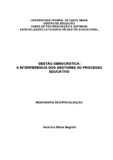| dc.contributor.advisor | Ludwig, Cristiane | |
| dc.creator | Begnini, Verônica Maria | |
| dc.date.accessioned | 2015-06-02T14:32:38Z | |
| dc.date.available | 2015-06-02T14:32:38Z | |
| dc.date.issued | 2012-12-01 | |
| dc.date.submitted | 2012 | |
| dc.identifier.uri | http://repositorio.ufsm.br/handle/1/850 | |
| dc.description | Monografia (especialização) - Universidade Federal de Santa Maria, Centro de Educação, Curso de Especialização em Gestão Educacional, EaD, RS, 2012. | por |
| dc.description.abstract | For present monograph search reflect about the school administration and the
educational process, like possibility to promote a critical learning and citizeness. In
this sense, the work has as goal analyze the actions that the managers, represented
in this research in the teachers' illustration, they seek to build of collective form,
having in mind the wide formation of the educational process, that is, of a critical
learning and citizen. For that, having as starting point the participation of all and as
point of arrival the critical learning and actors' citizen who integrate the school body
question itself: Does that way teachers' actions managers reflect in the critical
learning and citizen’s? Under the cloth of fund of these matters, the research of
qualitative mark presents some reflections derivatives of a study accomplished in
year of 2012, through the interview semi-structured, with the managers of the
municipal schools João Batista Reús Defendants and Zeferino Brasil, of the
municipal district Novo Barreiro/RS. The investigation is based theoretically for
authors who study the at issue thematic, among which ones stands out: Drabach
(2011), Arroyo (1979), Cury (1978), Stop (2000), Lück (2007). Such references
delineate the outlines of the democratic administration, identifying the participation
principles, of the autonomy and of the humanization as fundamental for the
promotion of a critical learning and citizen. This way, the study stamps the mark of
how the democratic administration is comprehended at analyzed municipal schools in
this work. The reflexive analyses point that the democratic administration enables a
larger participation of all involved them in the educational process, allowing school
aggregates the local necessary and global terms in syntony with the social matters:
Cultural, economic and political, seeking to sign the commitment with a critical
learning. | eng |
| dc.language | por | por |
| dc.publisher | Universidade Federal de Santa Maria | por |
| dc.rights | Acesso Aberto | por |
| dc.subject | Gestores | por |
| dc.subject | Aprendizagem | por |
| dc.subject | Gestão democrática | por |
| dc.title | Gestão democrática: a interferência dos gestores no processo educativo | por |
| dc.title.alternative | Democratic administration, the manager’s Interference in the do pedagogical | eng |
| dc.type | Trabalho de Conclusão de Curso de Especialização | por |
| dc.degree.local | Polo de Constantina, RS, Brasil | por |
| dc.degree.specialization | Gestão Educacional, EaD | por |
| dc.description.resumo | A presente monografia busca refletir sobre a gestão escolar e o processo educativo, como possibilidade de promover uma aprendizagem crítica e cidadã. Neste sentido, o trabalho tem como objetivo analisar as ações que os gestores, representado nessa pesquisa na figura dos professores, buscam construir de forma coletiva, tendo em vista a formação ampla do processo educativo, isto é, de uma aprendizagem crítica e cidadã. Para isso, tendo como ponto de partida a participação de todos e como ponto de chegada à aprendizagem crítica e cidadã dos atores que integram o corpo escolar pergunta-se: de que maneira as ações do processo educativo dos professores gestores reflete na aprendizagem crítica e cidadã? Sob o pano de fundo dessas questões, a pesquisa de cunho qualitativo apresenta algumas reflexões derivadas de um estudo realizado no ano de 2012, por intermédio da entrevista semi-estruturada, com os gestores das escolas municipais João Batista Réus e Zeferino Brasil, do município de Novo Barreiro/RS. A investigação é embasada teoricamente por autores que estudam a temática em questão, entre os quais se destaca: Drabach (2011), Arroyo (1979), Cury (1978), Paro (2000), Lück (2007). Tais referências delineiam os contornos da gestão democrática, identificando os princípios da participação, da autonomia e da humanização como fundamentais para a promoção de uma aprendizagem crítica e cidadã. Assim, o estudo traz algumas reflexões de como a gestão democrática é compreendida nas escolas municipais analisadas neste trabalho. As análises reflexivas apontam que a gestão democrática possibilita uma maior participação de todos os envolvidos no processo educacional, permitindo que a escola agregue as condições necessárias locais e globais em sintonia com as questões sociais: culturais, econômicas e políticas, buscando firmar o compromisso com uma aprendizagem crítica. | por |
| dc.publisher.unidade | Centro de Educação | por |


